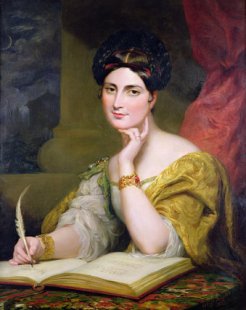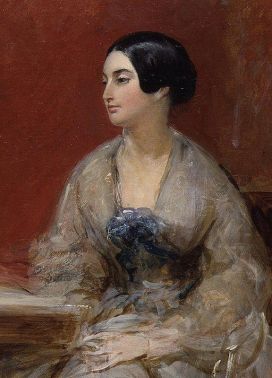
In an age in which English marriage law considered women not just less than equal, but absolutely nonexistent, Caroline Norton emerged as an unlikely hero. She is sometimes called an early feminist, but that is inaccurate. Pressured into marriage to a virtual stranger by her family’s financial problems, abused both physically and emotionally by her husband, object of general pity, falsely accused of adultery, separated from her children, and crippled financially by her manipulative husband, she fought back.
Caroline didn’t believe in woman’s equality with man, as did Wollstonecraft for example, and certainly never argued for it. What she did believe in was rule by law, laws that could be changed, and the obligation of the law to protect those dependent on others. She may have been without protection, money, or power, but she had two formidable weapons: she had influential friends and she could write.
Caroline’s early life is generally described one of poverty, and that is somewhat true. Her grandfather, the playwright Richard Sheridan, died in poverty, but in an age that knew true poverty, Caroline didn’t go hungry or lack shelter. However, her mother, who had been left with seven children to raise on a modest pension when her husband died suddenly, endured enormous financial insecurity and worried particularly for her three dowerless daughters throughout Caroline’s childhood. Still, her childhood cannot be called bleak. The Sheridans were an intellectually vibrant family with radical political leanings and a wide circle of friends. Her mother wrote novels, and Caroline was particularly fond of her uncle, Charles Sheridan, a noted if not particularly brilliant poet. She began writing and expressing herself at a very young age.
Once Caroline’s older sister made a successful marriage, Caroline didn’t question that it was her turn to do so, particularly because their youngest sister had begun to attract a number of suitors, and giving the family hope she might make a brilliant match. (So she did. Georgiana Sheridan became the Duchess of Somerset.) Caroline may not have wanted to stand in the way, may have desired to please her mother, or might simply have believed she would get no other offers. There had been none during her only London season. Whatever the reason, she agreed to marry Edward Norton, a man she had met only once three years before when she was sixteen. He had approached her mother at that time and been put off, apparently in hopes Caroline could do better. This time both mother and daughter agreed.

No one knows why Edward wanted Caroline, but his dissatisfaction with her surfaced early. The Sheridans were Whigs, if not outright radical, in their politics. Norton, a Member of Parliament and a staunch Tory, loathed much of what Caroline believed. Raised to argue her position, she must have been devastated when he kicked her for expressing views with which he disagreed. That kick early in the marriage was the first of extensive physical abuse. Various accounts describe Norton as “dull-witted” and indolent, the sort to be threatened by her wit, verbal dexterity, and vivaciousness. He wasn’t above using her social skills for political gain, however. He even encouraged her friendship with Lord Melbourne.
Money also caused trouble. Norton probably presented his financial status to Caroline’s mother otherwise, but he was in fact living on a barrister’s salary when he married. Though Lord Grantly’s heir, he received no allowance from the estate. He lost his seat in Parliament three years after they married. Extremely conscious of status, he refused work he considered beneath him, did little to help their situation, and pressured Caroline to convince her influential friends to get him an appointment, one he thought worthy of his rank. Eventually Melbourne gave him an appointment as a magistrate. Caroline, for her part, began to publish her writings, and he happily took the income from that.
The birth of three children and her writing gave Caroline some joy. She was a devoted mother. The violence, however, never let up. When she was pregnant with her fourth child, he beat her so badly she miscarried. After such episodes Caroline would go to her family for refuge but always went back. Arguing and violence escalated until one day, when Caroline was out, Edward sent their three children to a cousin and ordered the servants to lock her out of the house. He had, in essence, thrown her out.
Norton then brought suit against Melbourne for “Criminal Conversation,” or adultery, a first step in obtaining a divorce. He also hoped to milk money out of Melbourne. He lost. The jury didn’t even have to leave the courtroom; he was laughed out of court. The case had several results. Melbourne’s reputation and political position were upheld. Caroline was labeled a “scandalous woman” for the rest of her life. There could and would be no divorce. Only a man could sue for divorce, and she was a faithful wife. They were stuck with each other.
Worst of all he kept the children from her. Her only recourse was to attack the law that let him do it. Caroline rallied her friends and contacts. She finally convinced a member of parliament to introduce a bill to give mothers the right to appeal to the Court of Chancery for custody of children less than seven years of age. She continued to write, but now she wrote pamphlets brilliantly arguing for the rights of women to their children. It took two years, but in 1839 parliament passed The Infant Custody Act enabling women sue for custody of children under seven as long as they were not adulteresses. The act made married women visible in the law for the first time. Edward countered by moving her children to Scotland where the law didn’t apply. Three years later one of her sons died there before she was able to get to him.
Edward also denied her a home and refused to support her. Another woman might have been crushed under all that, but Caroline Norton was made of sterner stuff. She continued to write. She could support herself with her published works. Edward quickly claimed her income as his right.
Yes, he could do that.
She proceeded to send her bills to him, bills he was obligated to pay. Years of conflict followed eventually culminating in another court case in 1853. This time Edward won on a technicality because the particular creditor in question had presented his bill before Norton withdrew support.

Again Caroline fought back with her pen. Since her husband was entitled to all her income from writing, she dedicated that writing to one topic, marriage and property laws that enabled him to profit from her labor. She never argued for the equality of women. She focused entirely on the non-existence of women in marriage law.
A movement to change the laws was already underway and a number of women including Barbara Leigh Smith, Emily Davies, Elizabeth Garrett and Dorothea Beale, were lobbying for change. Caroline threw herself—and her pen—into the fray. NON-EXISTENT became a kind of rallying cry for her. Among other things, she wrote an open letter to Queen Victoria about the position of women in regard to divorce. When the Matrimonial Causes Act passed in 1857 it had 68 clauses, four of which came from Caroline’s pamphlets. It wasn’t perfect, but it was a step forward. It created a Court of Divorce and Matrimonial Causes removing divorce from both civil and ecclesiastical courts, and provided women recognition in law.
In later years Caroline continued to write. Her poetry and novels enjoyed some success, but today they are far less well known than her political writing. Edward Norton died in 1875. Two years later Caroline married a long time friend and supporter, Sir William Stirling-Maxwell. They died within months of each other later that year and are buried next to each other. Sadly, her oldest son predeceased her, and her only remaining son died within weeks of Stirling-Maxwell.
Caroline Norton never joined the earliest feminist circle, The Ladies of Langham Place, who had lobbied for the Matrimonial Causes Act, nor devoted herself to such women’s issues as education, the vote, or equality in employment. Still, her influential writing helped put the first cracks in the wall separating women from recognition under the law. She used her pen to stand up for herself and in doing so stood up for others who had no voice.*
Further Reading:
There are many pieces about Caroline Norton in print and on the Web. These three are particularly rich and well documented:
“Caroline Norton,” on Spartacus Educational.
Diniejko, Andreij, Contributing editor, “Caroline Norton: A Biographical Sketch,” on The Victorian Web.
Ockerbloom, Mary Mark, editor, “Caroline Norton (1808-1877)” on A Celebration of Women Authors, University of Pennsylvania Digital Library, 1994-2017.
 Caroline Warfield has been many things (even a nun), but above all she is a romantic. Having retired to the urban wilds of eastern Pennsylvania, she lets her characters lead her to adventures while she nudges them to explore the riskiest territory of all, the human heart. She is a regular contributor to History Imagined and to The Teatime Tattler, a blog in the shape of a fictional nineteenth century scandal sheet.
Caroline Warfield has been many things (even a nun), but above all she is a romantic. Having retired to the urban wilds of eastern Pennsylvania, she lets her characters lead her to adventures while she nudges them to explore the riskiest territory of all, the human heart. She is a regular contributor to History Imagined and to The Teatime Tattler, a blog in the shape of a fictional nineteenth century scandal sheet.
Her current series, Children of Empire, is set in the late Georgian/early Victorian era and focuses on three cousins, driven apart by lies and deceit, who must find their way back from the distant reaches of the empire—and the women who help make them whole. The second book in the series, The Reluctant Wife, set in India and England, was just released.
*Editor’s Note: Caroline Norton’s influence on modern matrimonial and custody laws cannot be understated. As a lovely (and telling) tribute, Daniel Maclise used her as the model for Justice in his fresco The Spirit of Justice in the House of Lords (top). See The Transfigurations of Caroline Norton for more on her influence on art and literature. -JC

This is a fantastic piece, Carol. Shared with pleasure
LikeLike
Caroline Norton chose her field of battle and her weapons in ways I admire. She battled the law itself for justice and used her pen as her weapon of choice. Women owe her a lot. Thanks for letting me write this one, Jessica.
LikeLike
A woman of steel! Wonderful post.
LikeLiked by 1 person
Great to read about Caroline, as I hadn’t heard of her before – and excellent to read of her success
LikeLiked by 1 person
Love it when I read something new to me! Terrific post!
LikeLiked by 1 person
Great article!
LikeLiked by 1 person
Thanks for the encouraging words, one and all. This was fun to write.
LikeLike